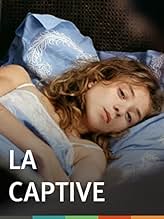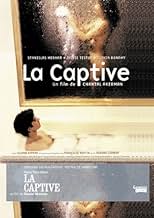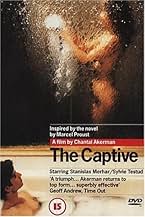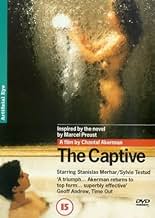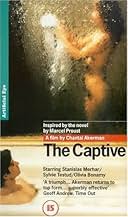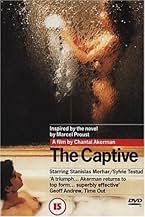CALIFICACIÓN DE IMDb
6.0/10
2.3 k
TU CALIFICACIÓN
La relación entre una mujer y su celosa pareja, cuya necesidad de poseerla lo convierte en rehén de sus propios deseos destructivos.La relación entre una mujer y su celosa pareja, cuya necesidad de poseerla lo convierte en rehén de sus propios deseos destructivos.La relación entre una mujer y su celosa pareja, cuya necesidad de poseerla lo convierte en rehén de sus propios deseos destructivos.
- Dirección
- Guionistas
- Elenco
- Premios
- 3 nominaciones en total
- Dirección
- Guionistas
- Todo el elenco y el equipo
- Producción, taquilla y más en IMDbPro
Opiniones destacadas
So many loud and shouting films, so much moving. This movie makes you calm down and should make you think. Aside from the literary background, which I didn't know when watching the movie, I found La Captive very intense and inspiring. If you are in a depressed state of mind, it might not be the right movie to watch. But anyway, then there is at least the great acting and the beautiful camera. My companion wanted to leave, but I resisted and it was worth it.
You have to read Proust to appreciate this movie. I imagine it was the most awful, boring treachery to subject someone to if they hadn't read La Captive. Ackerman is actually quite witty in portraying the mental restlessness of the characters, especially Ariane/Albertine constantly being caught in her poorly planned deceptions). In addition to this her visual portrayal of Proust's themes of desire and dissatisfaction are very poignant(although sometimes uncomfortable). An example being the bathing scene, where Simon/Marcel is most vulnerable and unselfishly sensual (I say unselfishly because of the contrast of the other sensual scenes where Ariane is sleeping) but this is only possible for him because of the distance and physical barrier between them. Ackerman is not entirely successful at putting Proust's La Captive on film, but she does make a beautiful, simplified attempt.
This film gets only 5.9?! First, I love Proust, but you do not have to read this specific part of 'In Search of Lost Time' to appreciate this extraordinary story of obsession and the need of one lover to absorb another, and the other lover to need to keep both a distance and a mystery in the relationship.
Chantal Akerman was arguably one of France's greatest directors before she was tragically lost. She was focused in a way that makes most directors seem fuzzy, and her talent with both images and actors was unbeatable. That her images and pacing take their time demands attention from an audience like any work of art. She uses Rachmaninov's music 'Isle of the Dead' as a key motif in sound that puts other overlaid music in most films to shame. I am here to praise this film, but her work as a whole deserves perhaps more praise than it gets. Eric De Kuyper, a great writer who wrote the script with her, is also a filmmaker of importance. Eric De Kuyper, a great writer who wrote the script with her, is also a filmmaker of importance. Everything is in order in this film. Both lead actors are superb, especially Stanislas Merhar who is, in my opinion, a male Garbo among actors. Elusive, beautiful and always holding an essential mystery in his way of acting, he rivets the gaze of the viewer to the screen. There is nothing to fault in this film, and impatient viewers, which most reviewers are, should watch it more than once. It deserves more than the insulting 5.9 it has been given, but then this perhaps reflects the quality of the eyes and minds that receive it.
Chantal Akerman was arguably one of France's greatest directors before she was tragically lost. She was focused in a way that makes most directors seem fuzzy, and her talent with both images and actors was unbeatable. That her images and pacing take their time demands attention from an audience like any work of art. She uses Rachmaninov's music 'Isle of the Dead' as a key motif in sound that puts other overlaid music in most films to shame. I am here to praise this film, but her work as a whole deserves perhaps more praise than it gets. Eric De Kuyper, a great writer who wrote the script with her, is also a filmmaker of importance. Eric De Kuyper, a great writer who wrote the script with her, is also a filmmaker of importance. Everything is in order in this film. Both lead actors are superb, especially Stanislas Merhar who is, in my opinion, a male Garbo among actors. Elusive, beautiful and always holding an essential mystery in his way of acting, he rivets the gaze of the viewer to the screen. There is nothing to fault in this film, and impatient viewers, which most reviewers are, should watch it more than once. It deserves more than the insulting 5.9 it has been given, but then this perhaps reflects the quality of the eyes and minds that receive it.
Having recently discovered French actress Sylvie Testud when I saw The Chateau, I was interested in this film because she's in it. I haven't read the story that the film is supposedly based on so I had nothing to compare it to when I saw it and therefore I went in without any preconceived notions. And with a film like this, a film that doesn't operate on any conventional filmmaking level, that is a very good thing.
This movie doesn't try to tell you what to think or feel about its characters; there is none of the contrivances so common in American movies, none of the manipulation. It just simply presents them and follows them and allows them to do what they do without the camera cutting away too soon for fear that the audience will get bored when there's not a lot "going on" in a scene - in fact some of the best scenes in the film have hardly any movement at all. And this is not done in a self-conscious, 'arty' let's-create-mood sort of way, which makes watching it - or rather experiencing it - even more hypnotic.
This is a film that must be experienced more than once, I would say: you're not really sure what's transpired OR how you feel about what you've witnessed upon a first viewing because it doesn't hit all the 'buttons' that a commercial film is compelled to hit. And Testud is brilliant, managing to imply complexity without demonstrating it (if that makes sense) - she's beyond subtle, beyond sublime.
This movie doesn't try to tell you what to think or feel about its characters; there is none of the contrivances so common in American movies, none of the manipulation. It just simply presents them and follows them and allows them to do what they do without the camera cutting away too soon for fear that the audience will get bored when there's not a lot "going on" in a scene - in fact some of the best scenes in the film have hardly any movement at all. And this is not done in a self-conscious, 'arty' let's-create-mood sort of way, which makes watching it - or rather experiencing it - even more hypnotic.
This is a film that must be experienced more than once, I would say: you're not really sure what's transpired OR how you feel about what you've witnessed upon a first viewing because it doesn't hit all the 'buttons' that a commercial film is compelled to hit. And Testud is brilliant, managing to imply complexity without demonstrating it (if that makes sense) - she's beyond subtle, beyond sublime.
At the start I found this film very slow and I think anyone would who did not appreciate its nature before watching it.
It's easy in this one to be put off with the almost entirely gloomy settings, however, they are part of the film and, as you begin to appreciate what the film is actually about, they make a lot more sense.
The film is not about a plot or a story, it is about the people in it. Nor does it tell you what it is about the people that you are meant to see. So this film is very much for the viewer who likes to watch, observe, think and conclude.
You basically get a very slow and moody perspective on a strange(?) boy girl relationship. The interaction between them is never really explained until right up till the end, so it's a case of watching and wondering what is going on between them.
Apparently uneventful, I found myself being slowly drawn into, seduced by, their romance, question being stacked on question till I did really feel a bit frustrated.
However, in the last 30-40 minutes this film suddenly becomes alive and you begin to understand what the point of it was. The point is very poignant and sad and would never have been put across had the earlier 3/4 of the film not been so 'uneventful'.
If you like poetry, you will probably like this film. It has you wondering and speculating right up to the last stanza when you then realise the point of what came before. It is a very sad but beautiful poem.
It's easy in this one to be put off with the almost entirely gloomy settings, however, they are part of the film and, as you begin to appreciate what the film is actually about, they make a lot more sense.
The film is not about a plot or a story, it is about the people in it. Nor does it tell you what it is about the people that you are meant to see. So this film is very much for the viewer who likes to watch, observe, think and conclude.
You basically get a very slow and moody perspective on a strange(?) boy girl relationship. The interaction between them is never really explained until right up till the end, so it's a case of watching and wondering what is going on between them.
Apparently uneventful, I found myself being slowly drawn into, seduced by, their romance, question being stacked on question till I did really feel a bit frustrated.
However, in the last 30-40 minutes this film suddenly becomes alive and you begin to understand what the point of it was. The point is very poignant and sad and would never have been put across had the earlier 3/4 of the film not been so 'uneventful'.
If you like poetry, you will probably like this film. It has you wondering and speculating right up to the last stanza when you then realise the point of what came before. It is a very sad but beautiful poem.
¿Sabías que…?
- TriviaChosen by "Les Cahiers du cinéma" (France) as one of the 10 best pictures of 2000 (#02).
- ConexionesFeatured in Women Make Film: A New Road Movie Through Cinema (2018)
- Bandas sonorasL'ILE DES MORTS, Op 29
Music by Sergei Rachmaninoff
Performed by Koninklijk Concertgebouworkest (as Royal Concertgebouw Orchestra)
Conducted by Vladimir Ashkenazy
© 1909 by HAWKINS & SON (London) LTD
(p) 1984 DECCA RECORDS COMPANY LTD
Avec l'aimable autorisation de UNIVERSAL MUSIC PROJETS SPECIAUX
Selecciones populares
Inicia sesión para calificar y agrega a la lista de videos para obtener recomendaciones personalizadas
- How long is The Captive?Con tecnología de Alexa
Detalles
- Fecha de lanzamiento
- Países de origen
- Idioma
- También se conoce como
- The Captive
- Locaciones de filmación
- París, Francia(setting of the whole action)
- Productoras
- Ver más créditos de la compañía en IMDbPro
Taquilla
- Total a nivel mundial
- USD 636
- Tiempo de ejecución1 hora 58 minutos
- Color
- Mezcla de sonido
- Relación de aspecto
- 1.85 : 1
Contribuir a esta página
Sugiere una edición o agrega el contenido que falta

Principales brechas de datos
By what name was La cautiva (2000) officially released in Canada in English?
Responda
